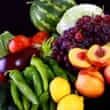Background
- One of the first proponents of eating organic food was Max Gerson, MD, who instructed his cancer patients to eat organic fruits and vegetables, starting in the 1920s. Interest in organic food dramatically increased in the 1960s, when several pesticides and fertilizers were found to be toxic to humans or animals. Third-party organic certification was first instituted in the 1970s by the some regional organic farming groups. Growers, consumers, and others in the agricultural industry began pushing for government-defined organic labeling in the 1980s.
- In the 1990s, the U.S. Congress passed the Organic Foods Production Act (OFPA), which required the U.S. Department of Agriculture (USDA) to develop national standards for organically produced agricultural products to assure consumers that products marketed as organic meet certain standards. The National Organic Program (NOP), part of the USDA's marketing service division, was created to fulfill the Organic Foods Production Act's directives. Neither the OFPA nor the NOP regulations address food safety or nutrition.
- In 2002, the USDA finalized its organic definition and inspection program, which was the most stringent in the world at that time. Since then, a few attempts to relax the guidelines have occurred, primarily in 2003 and 2005.
- According to the Organic Trade Association's 2006 Manufacturer Survey, the U.S. organic industry grew 17% overall to $14.6 billion in consumer sales in 2005: organic foods increased by 16.2% and represented $13.8 billion in consumer sales and non-food organic products increased 32.5% to total $744 million.
- Currently, in the United States, a product is considered "organic" if the food, the farm, handlers, and processors of that food all meet specific criteria from the USDA. Meat is organic if the animals do not receive any antibiotics or growth hormones and produce is considered organic if it was grown without most conventional pesticides or synthetic or sewage sludge-based fertilizers. Genetically modified (GMO) or bioengineered animals and crops are not allowed to be labeled organic, nor are products that have been ionized with radiation.
- Many people who choose to consume organic food vs. non-organic food do so because they believe that the food is more nutritious, contains fewer toxins from additives and pesticides, is more humane for livestock, and/or is more ecological.
- The USDA does not claim that organically produced food is safer or more nutritious than conventionally produced food.
- Currently, high quality studies supporting increased overall health for consumers of organic foods are lacking as are long-term safety studies. These studies are difficult to design and implement.
References
- Barrett, JR. OP pesticides in children's bodies. Environmental Health Perspectives 2006 Feb;114(2):112.
- Bourn D, Prescott J. A comparison of the nutritional value, sensory qualities, and food safety of organically and conventionally produced foods. Crit Rev Food Sci Nutr 2002;42(1):1-34.
View Abstract - Holmboe-Ottesen G. [Better health with ecologic food?]. Tidsskr.Nor Laegeforen. 6-3-2004;124(11):1529-1531.
View Abstract - Howard V. Organic food -- the view of a medical toxico-pathologist. British Journal of Midwifery 2003 May; 11(5):272, 274-275.
- Kajiya T, Kuroda A, Hokonohara D, Tei C. Heart failure caused by hookworm infection possibly associated with organic food consumption. Intern Med 2006;45(13):827-9.
View Abstract - Kopke U. Organic foods: do they have a role? Forum Nutr 2005;(57):62-72.
View Abstract - Lu C, Toepel K, Irish R, et al. Organic diets significantly lower children's dietary exposure to organophosphorus pesticides. Environmental Health Perspectives 2006 Feb;114(2):260-263.
- Magkos F, Arvaniti F, Zampelas A. Organic food: nutritious food or food for thought? A review of the evidence. Int J Food Sci Nutr 2003;54(5):357-371.
View Abstract - Magkos F, Arvaniti F, Zampelas A. Organic food: buying more safety or just peace of mind? A critical review of the literature. Crit Rev Food Sci Nutr 2006;46(1):23-56.
View Abstract - Newsome R. Organically grown foods: A scientific status summary by the Institute of Food Technologists' expert panel on food safety and nutrition. Food Technology 1990;44(12):123-130.
- Petrariu FD, Gavat V, Cozma AG. [Current issues regarding organic food]. Rev Med Chir Soc Med Nat Iasi 2005;109(4):866-870.
View Abstract - Ryan, GL. Whole-Food Supplements: The Prenatal Vitamin Option. Birthkit 2005 Summer;46:3.
- Thompson J. Vitamins, minerals and supplements: part two. Community Pract. 2005;78(10):366-368.
View Abstract - Williams CM. Nutritional quality of organic food: shades of grey or shades of green? Proc Nutr Soc 2002;61(1):19-24.
View Abstract - Williams RM. Organic Food versus Conventional. Townsend Letter for Doctors & Patients 2006 Jan; 270:26-28.







